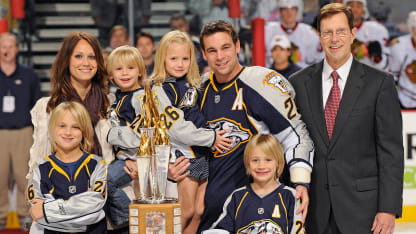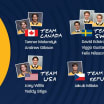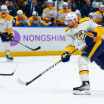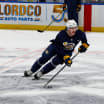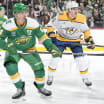In February 2007, Sullivan suffered a back injury in a game against the Montreal Canadiens that sidelined him for the remainder of the 2006-07 season, all of the 2007-08 season and the first half of the 2008-09 season. After nearly 23 months, Sullivan made his comeback in 2009 and became the franchise's first NHL award winner, receiving the Bill Masterton Memorial Trophy given "to the player who best exemplifies the qualities of perseverance, sportsmanship and dedication to hockey."
Sullivan was selected by the New Jersey Devils in the ninth round of the 1994 NHL Draft, and his NHL career included stops in Toronto, Chicago, Pittsburgh and Arizona. Still, Nashville is the team - and city - with which he identifies the most.
"This feels like home," said Sullivan, who returned to Bridgestone Arena Tuesday to take in the Predators' Central Division tilt with the Minnesota Wild. "Obviously I had some issues to go through myself, personally, with injuries and stuff, and the fan base was just outstanding. My kids were mostly raised here, too, so this is what they remember the most - that's a big piece of it. So for us, this is what we consider home."
Needless to say, the Nashville hockey market has evolved quite a bit since Sullivan's kids - now 23, 20, 18 and 17 years old - grew up here.
"Obviously, the organization had been here since '98," Sullivan said. "I got here in '04. So… it was still very niche. It was a really small, passionate fan base that would come to the games - you know, Cellblock 303."
Sullivan is of course referring to Section 303 at Bridgestone Arena - better known as Cellblock 303, home to what are arguably the Predators' loudest and proudest fans. If you've ever been to a Preds home game, you've likely heard one of the many chants that originated in Cellblock 303 during Sullivan's playing career and now reverberate throughout the entire arena.
"If you came to the games, it wasn't really full," Sullivan said. "But it was loud. You could see the fans were extremely passionate; we just didn't have the numbers… I think that we went from having, you know, 15,000 or 14,000 core fans, to now a full city with the backing of all the corporate sponsorships and everybody's involved. Everybody loves the Preds, and that's a testament to (General Manager) David Poile and (President/CEO) Sean Henry and the group here that that made everybody feel like they're a part of it. I mean, it's not just an NHL team - it's a part of the community, and I think that's why they've had so much success."
In addition to the franchise's evolution off the ice, Sullivan is also impressed with the on-ice product assembled by Poile and the Predators front office.
"The core group obviously had an outstanding season last year. Most of them had career years… It's a fun group, and I think with the pieces they added around it, they're in it to win now. Because of these great players that are here, you've got to try to take advantage of it. So I think they did a great job of surrounding that core group with some very good veterans and some extra help on the edges."
Sullivan, who served as a development coach for the Arizona Coyotes from 2014-20 before being named the organization's interim general manager, knows what it takes to develop young players. He believes the Predators and their AHL affiliate, the Milwaukee Admirals, are built to go the distance.
"You're always going to have to have an influx of young players coming in and making a contribution," Sullivan said. "They still have a couple guys in the minors that are having some pretty good years that haven't quite caught on yet. So you're hoping that those guys are going to continue to develop and join the team and help. If they're going to have a long run, you're going to need more than 20 or 23 guys - you're going to need 25 or 28 guys. So I think that they're built for that."
